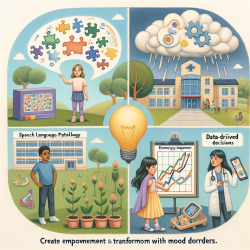Introduction
As a speech-language pathologist, understanding the complex interplay between psychological conditions and physical health is crucial for creating effective interventions. A recent literature review titled Post-traumatic stress disorder and its association with stroke and stroke risk factors provides valuable insights into how PTSD can independently influence stroke risk, which is vital for practitioners aiming to improve outcomes for children and adults alike.
Understanding PTSD as a Stroke Risk Factor
The literature review highlights that PTSD is increasingly recognized as an independent risk factor for stroke. This is significant because stroke is a leading cause of mortality and disability worldwide. The review emphasizes that traumatic stress not only predicts stroke but is also linked to many major stroke risk factors such as hypertension, diabetes, and dyslipidemia.
For practitioners, this means that when working with children or adults who have experienced trauma, it's important to consider these potential health risks. Screening for PTSD and understanding its potential impact on physical health can lead to more comprehensive care plans that address both psychological and physiological needs.
Implications for Practitioners
Practitioners can enhance their skills by integrating the findings of this review into their practice. Here are some actionable steps:
- Screen for PTSD: Regular screening for PTSD in patients, especially those with known stroke risk factors, can help identify individuals at higher risk.
- Holistic Care Plans: Develop care plans that address both the psychological and physical health needs of patients. This might include referrals to mental health professionals, lifestyle interventions, and regular monitoring of stroke risk factors.
- Education and Awareness: Educate patients and their families about the link between PTSD and stroke risk, empowering them to take proactive steps in managing their health.
Encouraging Further Research
While the review provides a comprehensive overview, it also highlights gaps in the literature that require further investigation. Practitioners are encouraged to engage in or support research efforts that explore the mechanisms linking PTSD and stroke, as well as effective interventions that can mitigate these risks.
Conclusion
Understanding the association between PTSD and stroke is crucial for practitioners aiming to improve health outcomes. By integrating these insights into practice, speech-language pathologists and other healthcare providers can offer more comprehensive care that addresses both the psychological and physiological aspects of health.
To read the original research paper, please follow this link: Post-traumatic stress disorder and its association with stroke and stroke risk factors: A literature review.










